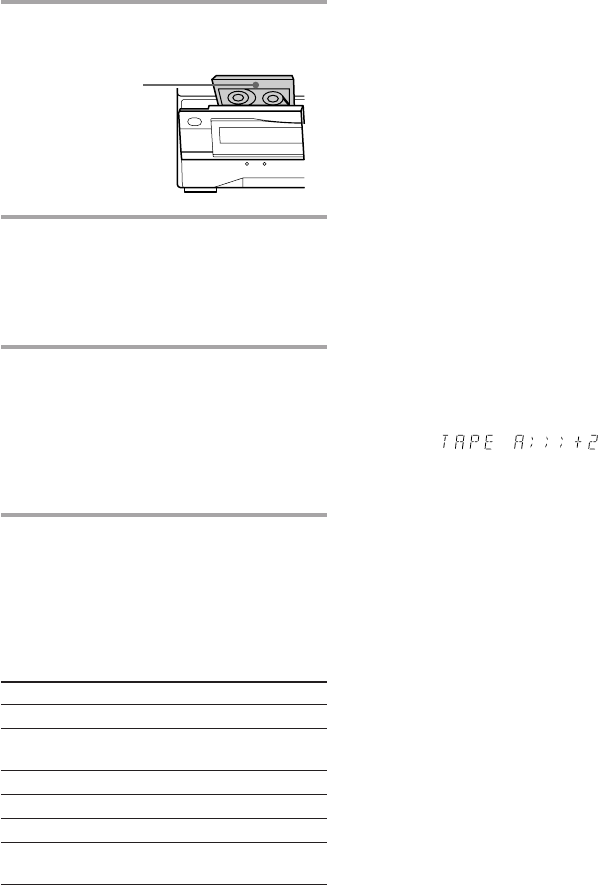
18
1 Press § and insert a recorded tape
in deck A or B.
2 Press DIRECTION repeatedly to
select A to play one side. Select
ß* to play both sides.
To play both decks in succession, select
RELAY (relay play).**
3 Press TAPE A (or TAPE B) (
(DECK A (or DECK B) ( on the
remote).
Press TAPE A (or TAPE B) 9 to play
the reverse side. (Press DECK A (or
DECK B) ( again on the remote to play
the reverse side.) The tape starts playing.
* The deck stops automatically after
repeating the sequence five times.
** Relay play always follows the following
sequence:
Deck A (front side), Deck A (reverse side),
Deck B (front side), Deck B (reverse side).
With the side
you want to
play facing
forward
To Do this
Stop play Press p.
Pause Press P PAUSE. Press
again to resume play.
Fast-forward Press 0 or ).
Rewind Press 0 or ).
Remove the cassette Press §.
Adjust the volume Turn VOLUME (or press
VOL +/– on the remote).
Playing a tape (continued)
Tips
•Pressing TAPE A (or TAPE B) ( or 9 when the
power is off automatically turns the power on and
starts tape playback if there is a tape in the deck
(One Touch Play).
•You can switch from another source to the tape
deck just by pressing TAPE A (or TAPE B) ( or
9 (Automatic Source Selection).
•When you want to reduce the hiss noise in low-
level high-frequency signals, press DOLBY NR so
that “DOLBY NR” appears.
•When dubbing tapes originally recorded with
Dolby NR, the dubbed tape is automatically
played with Dolby NR.
Searching for the beginning of a
track (AMS*)
During playback, turn the jog dial the same
direction as the 9 or ( indicator to go
forward. Turn the opposite direction to go
back. (Or press = or + on the remote.)
The search direction, + (forward) or – (back),
and number of songs being skipped (1~9)
appear in the display.
Example: searching forward 2 songs
* AMS (Automatic Music Sensor)
Notes
The AMS function may not operate correctly under
the following circumstances:
– When the unrecorded space between songs is less
than 4 seconds long.
– If completely different information is recorded on
the left and right channels.
– When there are continuous sections of extremely
low level or low frequency sound (like those of a
baritone sax).
– When the unit is placed near a television. (In this
case, we recommend moving the unit farther away
from the television or turning off the television.)


















